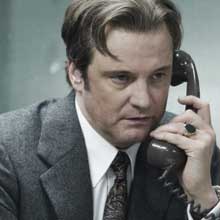Tomas Alfredson’s slow-burning, balletic adaptation of Tinker, Tailor, Soldier, Spy is rich in atmosphere, dripping with character and repressed emotion.
The manliest cast since 44 Inch Chest: Gary Oldman, Colin Firth, Tom Hardy, John Hurt, Ciarán Hinds, Mark Strong and Kathy Burke. Honestly, I was weak at the knees despite being seated; even the foppish Benedict Cumberbatch and the homunculus Toby Jones have so much charisma that it’s difficult for the screen to contain it all. Fortunately, being set in the ’70s, the atmosphere dampens down all those soft leather voices and agreeable jawlines; everything’s brown and grey, wet and cheerless. Even the office Christmas party reeks miserably of Scotch, smoke and weak gravy.

On the surface, Tinker is a spy drama about Oldman’s retired spy George Smiley trying to flush out a high-level mole. That’s just the plot, though: the film isn’t about who the mole is, isn’t a whodunnit, and when the mole is revealed, you’re unlikely to be thinking “Ah, of course!” or anything like that. You might muster up a ‘huh, ok’ before sitting back and letting the film continue. This is fine, because Tinker is all about Smiley’s process, not the result.
Watching Smiley go about this process is like watching a master craftsman at work. Patient and almost unbearably slow, he uses other people as tools and never breaks a sweat or takes much of a risk himself. Despite some personal history between himself and at least one of the suspects, he is the consummate professional.
Perhaps it’s because we know how Oldman can be when playing a character completely off the chain — Stansfield in Leon being the obvious example — that his silent performance here creates so much tension. He has a paunchy, laconic surface, but there’s a sense of angry righteousness underneath. His single-minded focus on the problem at hand is hypnotising, his emotional control so absolute that when he does briefly break, at one single point in the film, it’s all the more powerful.
Not that Smiley has the monopoly on tension; the secret homosexuality of several of the characters and the betrayals layered on betrayals create an atmosphere of total mistrust. MI6 is portrayed as a lost, dysfunctional organisation, riven with rivalries and shaken by Philby-era revelations. Tinker is an oppressive and bitter film, but you’re at least able to breathe and smile during the concluding moments.